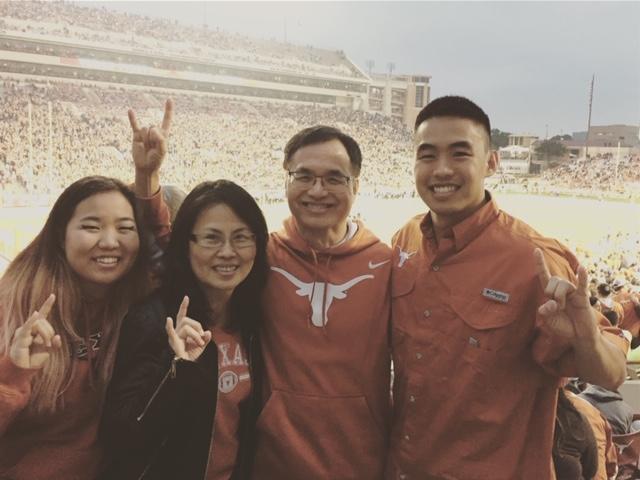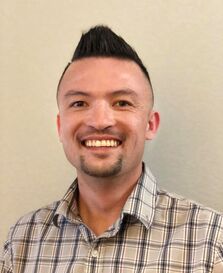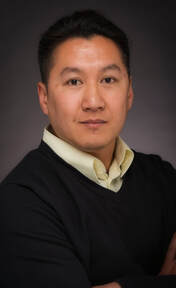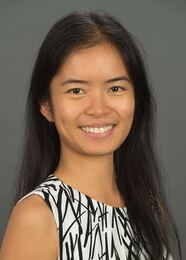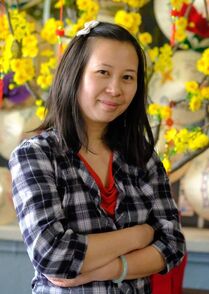We are Colorado
AAPI Emerging Leaders, 2019-2020
History Colorado has formed a brand-new collaboration with Dragon 5280 in support of its Emerging Leaders Program. This partnership collects and highlights stories of past and present leaders serving Colorado's diverse communities.
Alex Ju
I was born and raised in Houston, Texas. My parents immigrated from Taiwan in 1984 to attend graduate school at the University of Texas at Austin. My father received his PhD in Aerospace Engineering and my mother received her master’s in Education. Upon graduation, my parents moved to Houston, where my father worked for Shell.
My parents raised my sister and me, and pushed us to have a strong understanding of our identity. Unlike most Asian parents, they valued our attitude and effort over grades and extracurricular accomplishments. From their experience, they understood that hard work, dedication to always doing the right thing, and being a good human being were most important. As a result, my sister and I were able to excel in tennis and academics from self-motivation, rather than from the pressure of our parents.
My sister is currently pursuing her graduate degree in Chinese Medicine. I went on to follow in parent’s footsteps and attend the University of Texas at Austin, where I received my bachelor’s degree in Mechanical Engineering and a minor in Economics.
I was very lucky to grow up as an Asian American in Houston. Houston is a diverse city with a large Asian population. My parents never pushed my sister and me to be anything other than ourselves, so we never felt like we were not Asian enough or not American enough. I was able to grow up - as not only an American, but also a Texan - while still maintaining a deep grasp of my Taiwanese culture and traditions. My parents take me and my sister back to Taiwan every 2-3 years, where we can fully embrace our roots and gain a little insight to my parents’ home and childhood. When we go back, we visit my mom’s side of the family in Taipei, and my dad’s side of the family in Keelung. Despite my sister’s and my limited ability to speak the local language, we are still able to feel deeply connect to our Taiwanese heritage.
I moved to Colorado shortly after graduating from the University of Texas at Austin in July of 2019 to work for Lockheed Martin as a manufacturing engineer. It has been an incredible opportunity and experience to move to an entirely different place from where I was born and raised. It was a major change, including seeing a smaller Asian population and driving in the snow. I deeply enjoy all the things that Colorado has to offer, such as snowboarding and hiking in the mountains, colder weather, and beautiful views of the Rocky Mountains. Additionally, I can work part-time as a tennis coach at Lifetime Fitness to give back to the sport I loved growing up. Overall, moving to Colorado has been a great experience. Although the future is uncertain, I know I can see myself here for a while.
Chris Kim
I just know my grandfather - a little bit of history about him - so he fought in the Korean War. He got shot in the arm, so he got a pension plan from Korea. Ever since the war, he didn't really work. That's one thing I know about my grandfather on my mom's side.
My parents were born in this city in Southern Korean called Jeonju. They went to Jeonju University - that's where they met. They dated for ten years, and then they got married at the age of 28. They're both the same age.
My dad moved to Seoul, South Korea, which is the capital of the nation. When he moved up to South Korea he was lonely; he didn't really know anyone in the big city and he wanted a partner, so he asked his girlfriend at the time - who was still down in Jeonju - to live with him. Back in the day, people were a lot more traditional, very conservative. There was no such thing as living with a girl without getting married, so they got married and they started living together in Seoul, South Korea. My mom was a housewife. My dad worked at Hyundai Motors. My parents had my sister, and then in 1995, they had me.
My childhood in Korea - I remember playing a lot of video games, a lot of Starcraft. There's this place called PC Bang - basically, it means "PC Room" - where there are super high-speed computers. Gaming culture was huge in Korea, and that was my childhood. My mom has always been a religious person. She's been a churchgoer ever since she was young, so I went to church all the time with her as well.
At the age of 11 - my dad had been talking about this for a while - we had family out in Colorado. His sister was telling my dad about how great America is, the education system - all the great things about America, how they could potentially have a brighter future over there. My dad got convinced by my sister to move to America, so in 2006 we all moved to Colorado.
My aunt and her husband owned a dry cleaning business in Park Hill. It's called Park Hill Cleaners. It was a pretty successful business. They taught my dad and my mom the fundamentals of running the dry cleaning business, and my parents eventually bought their own dry cleaning business after about 2 months of living in America. The cleaners is out in Lakewood - it's called Five Star Cleaners. They still own it to do this day. They've been operating it since '06. We've become more successful over the years.
When I moved to America, it was definitely a culture shock. In Denver it's not as diverse as say the Bay Area [California]. We moved here when I was in 4th grade. I was one of the very few Asian kids that was in my school, but that caused quite a bit of conflict with me and my family as I was going to middle school and high school. In hindsight, I was just trying to fit in. I didn't have any Korean friends. I wanted to fit in with the crowd, and I wanted to assimilate. There was a lot of conflict because my parents still had the Korean values, and they wanted me to have the same values; but I was changing. I just developed a different perspective, different outlook on life, different way of life.
When I went to college, that really changed me. That allowed me to respect my parents' generation and get back to my roots. As I was growing up in America, I just tried so hard to fit in that I really lost my identity as a Korean. After college I really wanted to go back into the Korean culture and understand where I come from. I started to go back to the Korean church that I used to go to before college, and really got involved in the Asian community.
I work at New York Life as a Financial Professional. I really see that there is a need in the Asian American community in regards to financial services. My parents don't speak English, so that's a huge hinderance when it comes to living in America. When it comes to financial planning, they don't really have any resources that they can talk to.
First generation Americans are not very familiar with the concept of financial planning. That’s where I come in, and I educate them on how to plan for their financial future. I’m a resource to my parents as well as other Asian families in the area, and that really makes me fulfilled because I know that there is definitely a huge need, and I know that I’m a huge help to Asian families.
Chris Miranda
I was born in San Jose, California to immigrant parents. My father, of Filipino descent, migrated from the Philippines in the 1970s and my mother, of German descent, migrated from Canada in the 1960s. My parents met in the early 1980s. They both worked at AMD (Advanced Micro Devices) in Silicon Valley, the technological and innovative hub of the San Francisco Bay Area. They were married after a few years of dating, and gave birth to me a few years after that. Six years later, they gave birth to my sister. We are their only two children.
My paternal grandparents were originally from the Philippine province of Pampanga before they migrated to the National Capital Region of Metro Manila around 1940. They had all six of their children in Manila. My grandfather was a carpenter by trade, but had a strong passion for serving the community. Their house was one of the few in the neighborhood that had a water well, and used it to provide water to their neighbors. They raised pigs, prepared and sold different types of food, and played host to many neighborhood gatherings. The neighbors elected my grandfather as the “Capitan del barrio” - which translates to “Captain of the neighborhood” - and allowed him to serve and represent his neighborhood. This was a very prestigious title to hold, and makes me very proud of my grandfather.
Where I grew up in San Jose in the San Francisco Bay Area, culture was everything. I primarily identify as Filipino - not just because of the way I was raised, but because it gave me a sense of belonging in the diverse area I was raised. All of my friends growing up were Filipino, and many of them were my neighbors. Outside of our Filipino community, it was not hard to find people you could identify with, no matter the race and ethnicity.
Fast forward to 2017: I relocated to Colorado with my wife, who is also Filipino, and our two daughters. I work for Comcast and relocated to Colorado for a new opportunity within the company. Culture is a core value for both my wife and me, so we were very curious about what the cultural diversity would be like in the Denver Metro Area. We were quite surprised to see the presence of Asian communities in Denver, Aurora, and Centennial. This made us happy to know about the diversity here in Colorado. We are loving the decision we made to relocate our family here.
Khoi Huynh
I was born during one of the deadliest times of the Vietnam war - shortly after the withdrawal of US Troops in March 1973. The South Vietnamese government reported over 80,000 South Vietnamese military and civilian casualties by the end of 1974. We were living in Saigon for a short time before vacating to a smaller village where my mom grew up, Da Lat. While my dad was still being stationed as a medical officer to the north of us, it was just my older sister, my mom, and I at home.
While working to put himself through medical school, my dad met my mom teaching at the high school she attended. Their age gap probably didn’t sound as weird back then. My grandma was also very young when she was married off to a successful Chinese businessman as his second wife. She had not known how to read or write, so she taught herself and eventually taught my mother as well.
After a brief childhood in Vietnam, my family needed to escape the Communist regime. Because of his military affiliation, it would have been very dangerous for my dad to be captured. Soon, we became “boat people” and drifted away in the vast Pacific Ocean. Plagued with hunger, dehydration, and Thai pirates, my family and I pressed on until we were rescued and our ship was towed to Malaysia. We became adrift again, and ended up in the Philippines next. After exhausting our welcome and the local resources there, the Filipino authorities had us go back into our defective boat to be cast away at sea again. This time, however, a U.S. Vessel saw our S.O.S. We were brought onboard their massive ship and taken to Hawaii. The US Government granted my family political asylum, and we were flown to Denver, CO. Eventually, my whole family was naturalized and became US citizens.
Growing up in this foreign country with a foreign language to us was very strange - for both the kids and adults. My siblings and I had to speak our native tongue at home and English at school. It was very hard to learn both languages effectively. Finding and communicating with American friends also had its frustrations. We didn’t have any other extended family to rely on. Unfortunately, the younger generation’s newly founded Asian American culture clashed with our parents’ older, more traditional ways. The communication barrier still exists till this day; though, it has gotten better as time has moved on.
Even though segregation still exist today, even between Asian Americans, I’ve seen many barriers be taken down due to better cultural understanding and outreach. This is evident each year as when so many different ethnicities and generations come together to enjoy and compete in the annual Colorado Dragon Boat Festival. I’m so grateful to be able to participate freely with my family, friends, and co-workers in such a great event. Recently, opportunities have also opened up for me to take on a more engaging role to help to promote this exhilarating sport within our communities. At Comcast, where I work, we’ve already built up four teams - with 20 people in each boat. I also race year round with the Phantom Dragons. Five of my own children also compete with me. I enjoy sharing my passion for the sport, promoting cultural diversity and inclusion by serving on the Board of Directors for the festival, and co-leading Comcast’s employee resource groups.
Mary Lee Chin
I’m a registered dietitian by profession. I was born in this country in a town in Massachusetts called Brockton. My parents came from China - they were both immigrants. My father’s father - my grandfather - came over as a young man and worked to help build the railroads in the west. Then he went back to China. He and his wife had my father, and they sent him over when he was a young man, when he was 14 years old. He worked as a houseboy in his uncle’s Chinese laundry. When he was 20 years old, he went back to China and had an arranged marriage with my mom. That’s something that’s not as common today, but back then it was. She was only 16 years old. My dad was 20 years old. He stayed in China for two years, and my brother was born.
Then my dad came back to the United States. Because of the Chinese exclusionary laws that were in place in the United States, he could not bring my mother and brother over. They were actually separated for 14 years: her and my brother in China; dad, outside of Boston. During World War II, my father entered the US Army. He fought in Europe in the Battle of the Bulge. After the war, because he was an ex-GI, he was able to bring my brother and my mother over.
Their trip was pretty interesting. They came to the United States and landed on an island off Los Angeles - were there for 6 months while the authorities checked their documents to make sure they were actually related to Dad. The question they asked Mom: they showed her a picture of the village that she lived in - which was my dad’s village - and said, “Can you identify landmarks?”, such as the schoolhouse and the marketplace. She couldn’t because, as a Chinese woman, she was not allowed out of the compound. Finally, because my brother, as a 13 or 14 year old boy was allowed to roam the village unlike women and girls, he was able to identity the landmarks. So then they flew from LA to Boston; and I was born, and my sister was born.
When my grandfather was here, he worked the railroads, he did laundry - he did a lot of the low-income work that only the Chinese were allowed to do at that time. He was actually in Mexico during the big fire in San Francisco, which destroyed City Hall and all the records. The word went out that, “We have no records, so if you’re a citizen, come to the City Hall tent and say that you’re an American citizen, and we’ll give you your citizenship papers.” Grandpa, being not a fool, did that. As a result, he became a citizen, and my dad became an automatic citizen too.
I grew up in a small town called Rockland, which is about 20 miles outside of Boston. It was a blue collar town - very, very prejudiced, I would say. My parents were not highly educated. They ran the Chinese hand laundry, and they worked very, very hard and saved all their money so that my sister and I could go to college. It was difficult growing up being the only Chinese family in the town. We did face a fair amount of prejudice.
I remember working hard in the laundry pressing shirts one day, and I said to my dad, “Why do we have to work so hard? Why can’t I go outside and play like my friends?” My father said, “We work hard to earn money, save money, so you and your sister can go to school. Then you’ll never have to do a white man’s laundry again.” So that’s what I did. We worked hard, saved money. I went to do my undergraduate work at Purdue University, and it was like a whole new world opened up to me. There were opportunities, there were social opportunities, educational opportunities, support, mentoring, role modeling that I never got in my small town or in my small town high school. I’m very grateful to my parents that they gave me that opportunity.
And I remember one time, we went back out to the airport to wait for my husband to come in on a later flight. I turned to Dad, and I said, “Dad, now I understand why you worked so hard so that Nancy and I could get an education. Thank you very much.” This one tear coursed down his cheek, and that was the only time that I saw my dad cry. I really knew then - even though he and Mom worked at a very low-paying, hard job of washing and pressing shirts - that it meant the world to him that my sister and I were able to get an education. My brother, who did not have the benefit of getting the higher education like my sister and I, worked very hard. He opened a Chinese restaurant on Long Island, and through his hard work, he was able to give all six of his children advanced education too. I knew that meant so much to my dad; he could look at my sister, and me, and his grandchildren and say, “Smart ones, every one of them - it was worth it!”
In my life in Denver, I became more involved with the Asian community with Dragon Boat Festival. Five of my friends and I worked together - our leader was Ding-Wen Hsu - to create the Dragon Boat Festival. Denver had never seen anything like that before. It brought all the different Asian community groups together to put on a festival showcasing the best - not only of our traditional culture but of our modern culture too - our music, our food, our entertainment, the competitiveness of the boat races. I’m very proud of that being part of my legacy, in helping to create the Dragon Boat Festival.
Now, I’m really working hard on diversity and inclusion issues. One of the organizations that I’m deeply involved in is the Denver Botanic Gardens. We have worked hard to make sure that our Board represents all the diverse communities; not only because we want to have a Board that looks diverse, but also so that we present programs that are creative and speak to not only the general community, but also specific communities.
Professionally in my background as a registered dietitian, I also chair the Diversity and Inclusion Committee for our national organization, which represents 100,000 dieticians. About 90 percent of practicing dieticians are white women. I am going to try my hardest to try and change that dynamic, starting first working on pipeline student issues to get more students from diverse backgrounds within our profession.
Denver was not particularly diverse or well representative of the different communities of diversity when I moved to Denver over 45 years ago. I do see it changing now. I think the leadership organizations that Dragon Boat Festival has or Asian Pacific Development Center has really developed a new generation of young Asian American leaders who will carry forth the vibrancy of the Asian American community, and make them a bigger part of the dynamic, and the forward-thinking within our general Denver community.
Susan Lee
I was born and raised in sunny Florida in a city called Margate. It’s located about 45 minutes north of Miami. My younger sister and I are the first generation in our family to be born in the United States.
My parents are both from China, but they actually met in the Bahamas through family friends. My dad immigrated to the Bahamas as a teenager, and my mom came in her 30s. My dad was a chef his entire life. His dad was a restaurant owner in the Bahamas. My mom was a doctor in China. After she immigrated to the US, she couldn’t be a doctor anymore because of the language barrier; so she worked in the restaurant industry instead.
There were not many Asians in my hometown, so my sister and I were always one of the only Asian Americans in our classes. My high school graduating class had around 600 students, and I only knew three Asian Americans from my class. From my experiences, Asians were definitely stereotyped as intelligent. I distinctly remember how, even though I excelled in my classes every year, my classmates seemed to take it for granted and rarely recognized the effort that I put into my work. There were also multiple instances where students who I didn’t know would attempt to “speak” Chinese mockingly in front of me. I quickly learned to simply ignore them. Despite the lack of an Asian community at school, there were particular places in my hometown where I did feel its presence: the Asian supermarkets and dim sum restaurants. At these places, everyone spoke Chinese, and it didn’t feel like we were in the minority anymore. I remembered when I finally left Florida to attend UC Berkeley, it was a culture shock for me to be surrounded by so many Asian Americans. Soon enough, I quite enjoyed it and became good friends with many of them.
Currently, I am a chiropractor. I moved to Colorado in January 2019 to complete my chiropractic internship here before graduating in March. Despite the snow and the cold, I decided I still preferred it over the heat and humidity in Florida. The mountains here are absolutely breathtaking, and I like how Coloradans tend to be more health conscious and active. So I stayed and opened my own office in Aurora. In my free time, I enjoy attending Brave Church, tutoring math, and spending time with friends.
Trungdung Tan
My parents grew up during a time of war in Vietnam. My father was the eldest child to an educator in a French school in Vietnam. In fear of persecution by the Communist movement, my father was sent to Saigon to live with his aunt when he was 14 so he could continue his studies. As for my mother, she was the first female in her village to finish high school. In 1968, my mother came home during an end-of-year break from her high school in Hue. Only a few days later, news of the Hue massacre reached her, and she found out many people in Hue were murdered or buried alive by the Communists. In order to continue her education, my mother had to sneak out of her village by hiding her books in a vegetable basket. She was able to return to Hue a year later to finish high school; however, many of her friends and former classmates weren't as fortunate.
My parents met each other at the middle school in Pleku where they both taught. After getting married, they lived on the military base where my father worked as a writer in the military's communication branch. A few years later, my brother and sister came along. Then South Vietnam fell to Communism in 1975. My family lost everything and eventually relocated to an uninhabited, mountainous, forested area that was branded as a new economic zone. Two weeks after my family arrived in the new area, my father was ordered to report to a camp for re-education. He was instructed only to pack clothing and food sufficient for 10 days. In good faith and hopes for a new beginning, my father reported to the camp. However, his hopes were quickly diminished when he realized the re-education camp was actually a hard labor prison for political oppositions. For 8 years, my father endured starvation and disease while he was forced to do hard physical labor from sunup to sundown. During those 8 years, my mother was left behind to raise my brother and sister by herself. In 1983, our family experienced a miracle when my father was suddenly released from the labor camp without notice. In search of my family, my father returned to Saigon, where, by fate, my mother and my siblings were visiting relatives for the Vietnamese New Year. Two years later, I was born.
When my father heard about the opportunity for former political prisoners and their families to immigrate to the US, he was hesitant — he did not want to be taken away from his family a second time. Ultimately, he decided to take on the risk of filing the required immigration paperwork and reached out to a distant relative in Colorado to see if he would be willing to sponsor our family. After a few setbacks, our family took our first step on Colorado’s soil on June 9, 1995. Finally, my father secured the new start for our family that he had wanted all those years ago.
My family arrived with nothing but the clothes on our backs, so we started with a blank slate. With a lot of hard work and the ability to save, my parents and siblings have fulfilled their American dream of being small business owners, as well as homeowners. As for myself, I was able to enjoy the benefits of the public education system and take advantage of student loan programs to put myself through college. I now work as an accountant and actively participate with a Buddhist youth group. In addition, I have a terrific daughter who will also be able to make her own destiny.
My family and I are extremely grateful for the freedom and the opportunities America offers. Without this freedom, I would not be able to learn about my family’s heritage and history. Only after our family settled here in Colorado did my parents finally feel free enough to voice their opinions and share their life stories.
Our Partner


